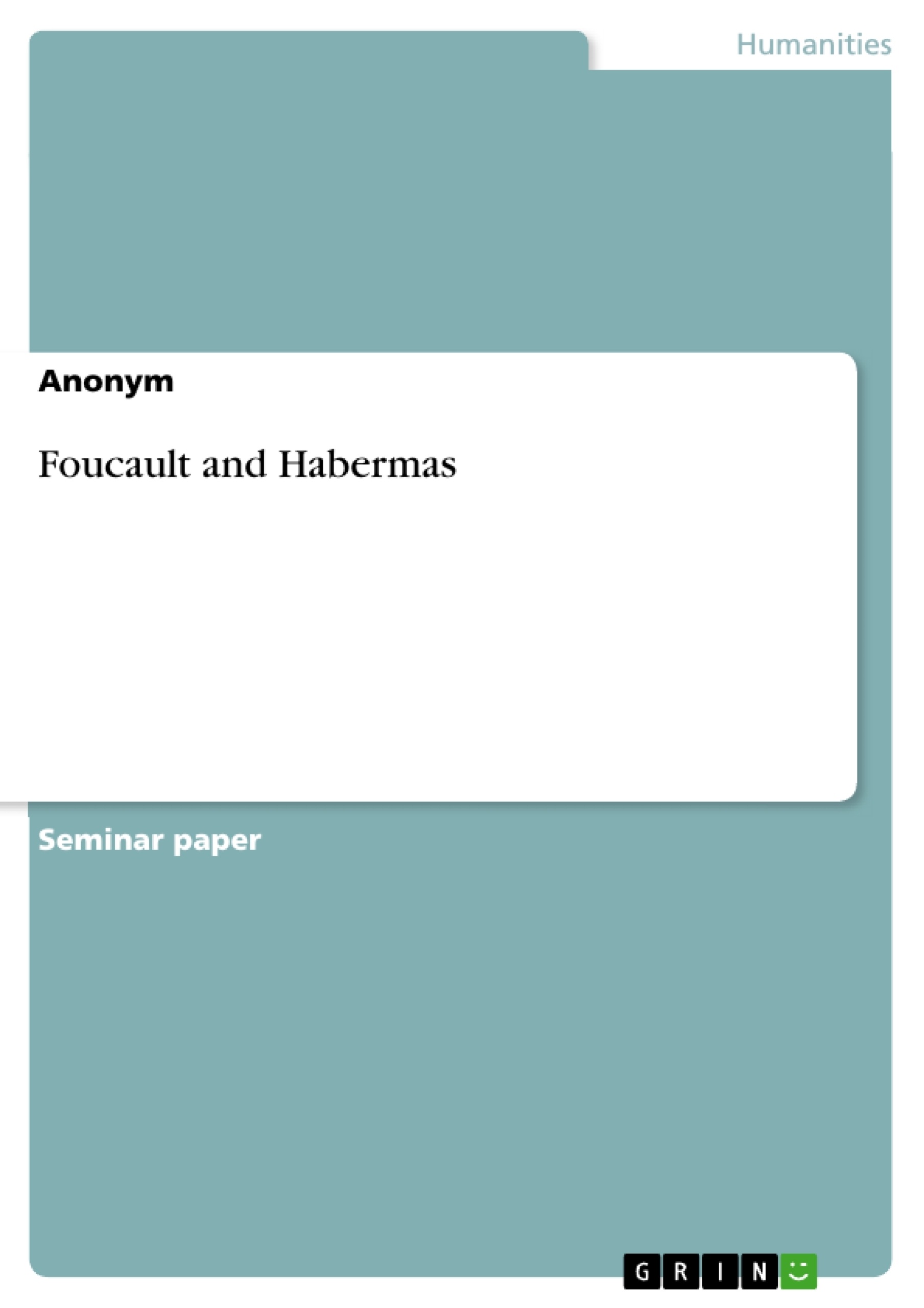Max Weber’s thesis that the rationalization of Western societies in the course of the Enlightenment has been an irreversible process is one of the central and most consequential discoveries in modern European political thought. Its significance lies in the fact that any philosopher or social thinker who engages in an analysis of western societies must come to grips with the question what ‘Enlightenment’ means and involves. The various contemporary political theories of action can be distinguished in regard to their specific answers to that question, for these answers define the realm of that which is politically possible under the conditions of Modernity.
Michel Foucault and Jürgen Habermas, who represent two of the most influential theories, both present powerful arguments for their respective assessments of the Enlightenment. However, these assessments are rather incompatible. Foucault, who devoted much of his life to the struggle against the hidden workings of an apparently ubiquitous and suppressive power, presents a decisively pessimistic account. For him, the Enlightenment has increased and sophisticated the techniques of power, which pervades and - more significantly - constitutes societies and their members as an invisible force while shaping the forms of knowledge that are generally accepted as given by them. Habermas, whose social philosophy has repeatedly proven its applicability to (foremost German social democratic) concrete governmental questions, is not as monistic as Foucault. There is no central category such as ‘power’ in his thought. This seems to be related to Habermas’s objects of study as opposed to Foucault’s. Foucault likes to look at the borders of society, at the psychiatric clinic, the prison, and defamed sexuality. Habermas, while not denying the existence of these, rather focuses on the development of middle class life and its institutions, foremost the public sphere and political institutions such as the parliament. Both of them are historical thinkers, and certainly both fill the empirical vacuum left by the Frankfurt school’s masterpiece on the Enlightenment, Adorno’s and Horkheimer’s Dialektik der Aufklärung,with historical scrutiny. Significantly, though, Foucault’s assessment of the Enlightenment stays much closer to theDialektik der Aufklärungthan Habermas. [...]
Inhaltsverzeichnis (Table of Contents)
- Importance and Consequentiality of Evaluating the Enlightenment
- Foucault's Reformulation of the Dialektik der Aufklärung
- Foucault's vs. Habermas' Evaluation of the Enlightenment
Zielsetzung und Themenschwerpunkte (Objectives and Key Themes)
This paper examines the contrasting perspectives of Michel Foucault and Jürgen Habermas on the Enlightenment, focusing on their evaluation of its impact on modern society. Both thinkers, representing influential theories, offer powerful arguments for their respective assessments, highlighting the complex and enduring significance of the Enlightenment in shaping contemporary political thought and social structures.
- The lasting consequences of the Enlightenment on Western societies
- The role of reason in the Enlightenment and its impact on power dynamics
- Contrasting perspectives on the Enlightenment: Foucault's pessimism vs. Habermas's nuanced view
- The relationship between power, knowledge, and social control in modern society
- The significance of historical analysis in understanding the Enlightenment's legacy
Zusammenfassung der Kapitel (Chapter Summaries)
- Importance and Consequentiality of Evaluating the Enlightenment: This chapter introduces the central thesis of Max Weber concerning the irreversible process of rationalization in Western societies as a consequence of the Enlightenment. It emphasizes the crucial importance of understanding the meaning and implications of the Enlightenment for any analysis of modern societies. The chapter also presents the contrasting views of Foucault and Habermas regarding the Enlightenment, highlighting the significance of their respective assessments in defining the realm of political possibility within modernity.
- Foucault's Reformulation of the Dialektik der Aufklärung: This chapter focuses on Foucault's reinterpretation of Adorno and Horkheimer's Dialektik der Aufklärung, exploring the parallels between their respective critiques of the Enlightenment. It argues that both thinkers view the Enlightenment as a form of subtle tyranny that has led to increased power and control over individuals. The chapter delves into Foucault's central concept of "power" and its manifestation in everyday practices, drawing connections to Adorno's notion of the subject being reduced to a mere intersection of conventional reactions and objective functions. Furthermore, it highlights Foucault's analysis of the prison as a paradigmatic locus for understanding the Enlightenment's model of power, emphasizing the shift from public punishment to a system of discipline and control over the individual's body and behavior.
Schlüsselwörter (Keywords)
The primary focus of this text lies on the critical evaluation of the Enlightenment and its lasting impact on Western societies. Key concepts include rationalization, power, control, discipline, knowledge, subjectivity, modernity, and historical analysis. The work engages with the ideas of prominent thinkers like Max Weber, Michel Foucault, Jürgen Habermas, Theodor W. Adorno, and Max Horkheimer, exploring their contrasting perspectives on the Enlightenment and its complex relationship with the development of modern social structures and political thought.
Frequently Asked Questions
How do Foucault and Habermas differ in their view of the Enlightenment?
Foucault is pessimistic, seeing the Enlightenment as a source of sophisticated power techniques and social control. Habermas is more nuanced, focusing on the potential for rational communication and democratic institutions.
What is Max Weber's central thesis mentioned in the text?
Weber argued that the rationalization of Western societies through the Enlightenment is an irreversible process that defines modern European political thought.
What does Foucault mean by "power" in the context of Enlightenment?
For Foucault, power is not just held by a central authority but is an invisible force that constitutes societies and shapes what is accepted as knowledge and truth.
Why does Foucault focus on prisons and psychiatric clinics?
He looks at the "borders of society" to illustrate how systems of discipline and control are applied to the individual's body and behavior under the guise of Enlightenment progress.
What is the focus of Habermas's social philosophy?
Habermas focuses on the development of middle-class institutions, the public sphere, and political systems like parliament as sites for potential rational discourse.
- Citation du texte
- Anonym (Auteur), 2002, Foucault and Habermas, Munich, GRIN Verlag, https://www.grin.com/document/60800



